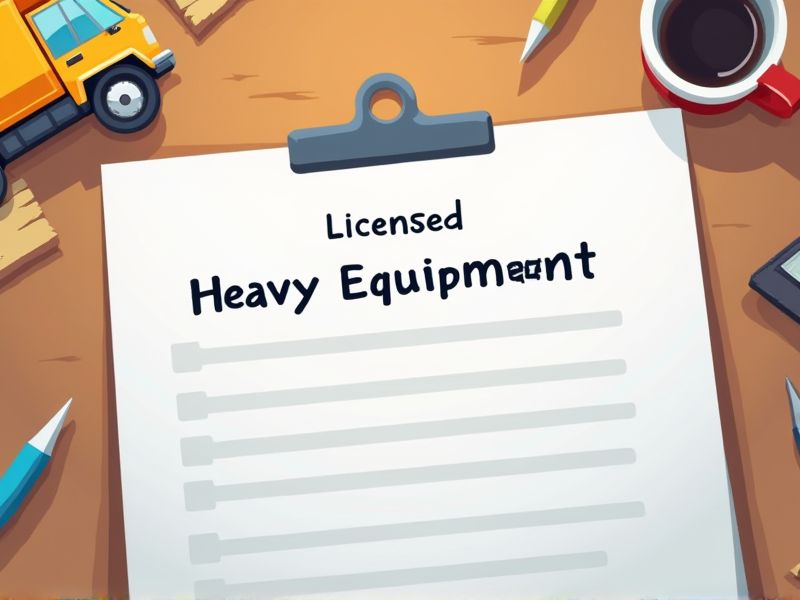
Licensed Heavy Equipment Operators are responsible for handling complex machinery that demands precision and safety, making specific certifications crucial. Obtaining certifications ensures the operator is equipped with the technical skills and safety practices needed to prevent accidents and equipment damage. Certified operators contribute to operational efficiency, reducing downtime and enhancing workplace reliability. Important certifications you may need for Licensed Heavy Equipment Operator include those in specific machinery categories and safety protocols.
NCCER Certified Heavy Equipment Operator
Having an NCCER Certified Heavy Equipment Operator ensures standardized skills and competencies, which employers find reliable. The certification acts as an industry-recognized benchmark, enhancing the trust employers have in a licensed operator's abilities. It often leads to improved safety records on job sites, as certified operators are trained in best practices and accident prevention. Employers may prefer certified operators because this qualification can result in reduced insurance costs due to demonstrated professionalism and competence.
NCCCO Crane Operator Certification
The NCCCO Crane Operator Certification is required to ensure the safety and competency of heavy equipment operators, as it validates their ability to properly handle cranes. This certification is acknowledged by regulatory bodies and aligns with industry standards, thus reducing the likelihood of accidents. Employers benefit from hiring certified operators because it minimizes liability and enhances operational efficiency. Certified operators typically command higher wages, reflecting their expertise and commitment to maintaining safe work environments.
OSHA 10 Construction Safety Certification
The OSHA 10 Construction Safety Certification provides foundational knowledge on recognizing and mitigating workplace hazards, crucial for heavy equipment operators who work in high-risk environments. Licensed heavy equipment operators who maintain this certification demonstrate a commitment to safety protocols, which reduces accidents and enhances jobsite safety. This certification can also lower liability risks for employers, as operators are more informed about compliance with Occupational Safety and Health Administration standards. Operators with this certification are often more marketable, as employers prefer candidates who have proven their dedication to rigorous safety practices.
OSHA 30 Construction Safety Certification
The OSHA 30 Construction Safety Certification equips licensed heavy equipment operators with comprehensive knowledge about workplace safety regulations, reducing the likelihood of accidents. In the construction industry, adherence to safety standards can lead to safer job sites, which decreases the risk of costly injuries. Certified operators are more aware of potential hazards, ensuring better protection for themselves and their coworkers. Employers benefit from hiring OSHA-certified individuals due to lowered liability and enhanced safety compliance, fostering a more efficient work environment.
Commercial Driver's License (CDL) Class A
Operating heavy equipment often involves driving vehicles that meet criteria for a CDL Class A, such as gross combination weight rating (GCWR) of 26,001 pounds or more. Having a CDL Class A ensures operators have the necessary skills to handle both heavy equipment and the trucks that transport them. Regulatory compliance mandates a CDL for operating certain heavy vehicles across state lines. Employers prefer or require a CDL Class A for liability and insurance purposes.
Forklift Operator Certification
Forklift Operator Certification ensures that a licensed heavy equipment operator understands the specific operational and safety protocols associated with forklifts, which can differ from other heavy equipment. Compliance with OSHA regulations is maintained when operators hold the appropriate certification, reducing liability for employers. Proper certification also enhances workplace safety, as operators are trained to handle forklifts more effectively, minimizing the risk of accidents. Employers often require certification to verify that an operator has the necessary skills to safely and efficiently perform tasks with forklifts.
Rigging and Signal Person Certification
The Rigging and Signal Person Certification ensures that heavy equipment operators adhere to safety protocols, reducing the risk of accidents. Certified operators have proven their understanding of best practices for load handling, which makes construction projects more efficient. Legal and regulatory bodies require this certification to establish competence in handling specialized equipment, thus minimizing liability. Certification fosters trust among employers and clients by guaranteeing that operators can effectively communicate and coordinate movements on a job site.
Elevated Work Platform (EWP) Certification
Elevated Work Platform (EWP) Certification ensures operators understand specific safety protocols related to working at heights, reducing the risk of accidents. Specialized skills obtained through certification enable operators to handle EWPs efficiently, ensuring productivity. Compliance with local and international safety regulations often mandates such certification, protecting both operators and employers legally. The diverse environments in which heavy equipment operators work require adaptability, and EWP certification provides necessary knowledge for various operational scenarios.
First Aid/CPR Certification
First Aid/CPR Certification is needed for licensed heavy equipment operators because operating machinery involves high-risk environments where accidents can occur. In the event of an injury, trained operators can provide immediate assistance, reducing the severity of injuries. Knowledge of CPR and first aid ensures operators can stabilize a victim until professional medical help arrives. This certification also ensures compliance with safety regulations and can lead to improved workplace safety standards.
Traffic Control Safety Certification
Traffic Control Safety Certification is needed for licensed heavy equipment operators due to regulatory compliance mandates that require operators to follow strict safety protocols. Without this certification, operators may be unaware of guidelines that prevent accidents in high-risk environments. Proper certification enables operators to effectively communicate and coordinate with traffic control personnel, reducing the likelihood of worksite incidents. This certification ensures both operator proficiency and public safety are prioritized during operations that interact with traffic.
Summary
You, as a Licensed Heavy Equipment Operator, might enhance your job prospects by gaining additional certifications. These qualifications can increase your skill set, making you more attractive to potential employers. Acquiring certifications could potentially lead to higher wages and more advancement opportunities. Employers often value certified operators, resulting in safer and more efficient work environments.
